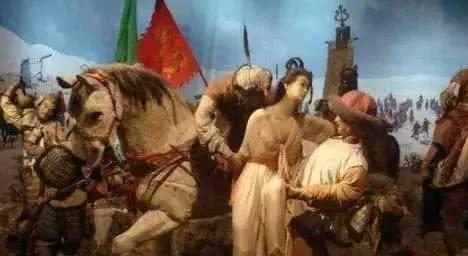
In ancient times, hostages were often taken prisoner by the enemy and blackmailed in this way. In order to protect the hostages, many people have to obey the requirements of thieves. But what about officials, especially generals, who encounter this situation on the battlefield? Therefore, as early as the Han Dynasty, there was a law that thieves threatened hostages, and the hostages were shot together with the thieves.
In the Han Dynasty, scholars established themselves and families in name only, and in order not to make people feel that they were abolishing state affairs because of their private feelings, they often carried out this order with tears. However, people have feelings, so this law was basically abolished after the Han Dynasty, and many generals chose to take care of their families.
In the Chen Dynasty during the Southern and Northern Dynasties, in October 569, Guangzhou assassinated Shi Ouyang Qi and plotted a rebellion. In February of the following year, Ouyang Sent Yangchun Taishou Feng to Gaoyao (高要, in modern Zhaoqing, Guangdong) to induce him to participate in the rebellion. Feng Shu was the younger son of Xian Tai, and because of his outstanding ability, he later replaced his brother in charge of the Feng family.
After Feng Shu arrived at GaoYao, he learned that Ouyang Qi had rebelled completely. Although he was reluctant to cooperate with the rebels, he was already trapped in the nest of thieves and could not escape, so he had to secretly order his entourage to quickly return to Liangde to inform his mother-in-law Lady Xian of the situation here.
Xian Tai received a secret report and knew that the matter was very serious, and Feng Servant was again held on a high level, and if he did not comply, he would most likely be killed. What to do?
After carefully considering the interests of the state and individuals, Madame Sin said with a full sense of justice: "I am loyal, I have experienced two generations, and I cannot afford to lose the country without pity!" ”
Therefore, Lady Xian immediately dispatched troops to strengthen the defense, and at the same time personally led the Baiyue chieftain and the strong horse elite troops of various tribes to the north to fight against Ouyang Qi.
They and the large army of Zhang Zhaoda, a counterinsurgency general sent by the Chen Dynasty, cooperated with each other, forming a situation of attacking from the north and the south.
The rebels of Ouyang Qi, the assassin of Guangzhou, saw that Lady Xian disregarded the life of her son, and when Feng Shu was still alive, they were bent on revenge for "killing their sons", and the military of Ouyang Qi's rebel army was in chaos, and the thieves would block the angry and corrupt Ouyang Qi from killing Feng Shu in order to avoid being killed by Lady Xian after the defeat.
Under the persecution of Lady Xian and Zhang Zhaoda's officers and soldiers, the birds and beasts scattered and collapsed into an army.
In the end, Ouyang Qi and others were captured, and Lady Xian did not kill them on the spot, but sent them to Jiankang to be sent by the imperial court. In the end, Xian Taiping prejudged the Ouyang Rebellion, and his son Feng Shu also survived because of Xian Tai's fierce attack.
After quelling the rebellion, the Chen Dynasty conferred on Lady Xian and other meritorious people. Feng Shu, because of his tactfulness, provided Lady Xian with information on Ouyang's rebellion, so that she quickly made a decision to put down the rebellion, and was named the Marquis of Xindu, the general of Pingyue Zhonglang, and transferred to Shilong Taishou; The appointment of Lady Xian as a zhonglang general and a lady of Shilong, and was rewarded with four ceremonial vehicles, a splendid general flag, and a set of staff ceremonies, and the ceremony and courtesy treatment were all carried out according to the standards of the official position of the assassin.
In the first year of De (583), Lady Xian's son Feng Shu died. Feng Shu's three sons: Feng Soul, Feng Xuan, and Feng Ang, were small and shrewd. Under the cultivation and edification of their grandmothers, they all had both moral integrity and ability, and they were both literate and martial, and they became Lady Sin's right-hand men in governing the government.
In modern times, the Liangguang area still retains many of Lady Xian's brave and resolute style, and she has made a lot of reputation for the warlords of Liangguang in the chaotic era of the late Qing Dynasty!